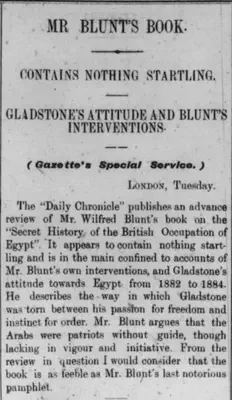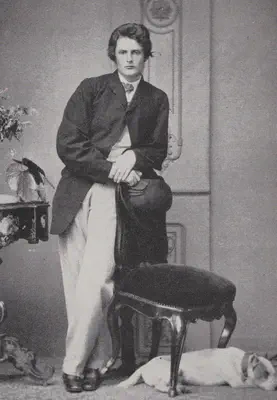Review of a Review of a Review of a Book

Secret History of the English Occupation of Egypt: Being a Personal Narrative of Events, written by Wilfrid Scawen Blunt, was given an uninspiring review in the Egyptian Gazette. This short piece, found on the third page of June 4, 1907, was comically scathing in its evaluation. Whoever wrote the review said that the publication “appears to contain nothing startling” and “is as feeble as Mr. Blunt’s last notorious pamphlet.” Given Blunt’s usual mix of erotic poetry and political statements, I wonder which apparently uninspiring work is being referenced here. The reviewer condemns the focus on “accounts of Mr. Blunt’s own interventions,” an odd criticism given the book’s clear self-identification as a “Personal Narrative," as well as his numerous mentions of Prime Minister Gladstone’s opinions. Gladstone’s name is indeed referenced 109 times within the book. However, seeing as Gladstone had an immense amount of influence over British politics in the late 19th century, his inclusion in Blunt’s narrative seems fitting. As no information about the author is provided for the review, there is little way of deciding whether the reviewer’s disdain of Blunt is due to literary or political reasons.
Wilfrid Blunt held such contentious opinions as supporting Celtic and African freedom from the British empire. As the Egyptian Gazette was highly supportive of British imperialistic efforts (it was, after all, written for Englishmen and Frenchmen residing in Egypt), it makes sense that the writers would disapprove of Blunt. Blunt had a long and tumultuous history with Lord Cromer, consul general of Egypt and darling of the Egyptian Gazette. Blunt was Cromer’s political enemy. In a time when few British individuals opposed colonialism, Blunt encouraged opposition to the British agenda. Oddly enough, despite their political differences, Blunt and Cromer seemed to be friends of a sort. Cromer even accompanied Blunt’s daughter Judith at her wedding in Blunt’s place.

I question whether the reviewer actually read the book, as he relies heavily on another newspaper’s thoughts. This is what caught my attention the most. It is a review based on another review of a book. It begins with the words “The ‘Daily Chronicle’ publishes an advance review of Mr. Wilfred Blunt’s book…” and ends with “From the review in question I would consider…” I suspect that any attempts to unravel this mystery would have to begin by examining the political leanings of the Daily Chronicle and the work itself.